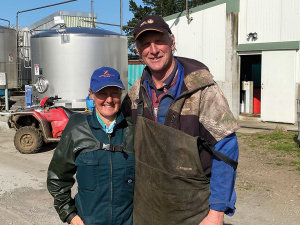Probiotic Revolution claims that farmers using its probiotics are achieving outstanding results in mastitis control.
These products have been used to treat clinical cases as well as at dryingoff, or with springers and during lactation.
The company says the best results have been achieved by John and Donna McCarty, who milk 350 cows at Kaponga.
The first year they had their herd on BioRumen, primarily to improve feed conversion efficiency, they treated a hand full of clinical mastitis cases with Bovine Boost – and they all came right. As a result, the McCartys were determined to go antibiotic free the following season.
They sat down with Probiotic Revolution’s Chris Collier to work out how to do this, the company says.
“The first step was to pick out their high somatic cell count cows at dryingoff and treat their trough with Bovine Boost for five days.
“That winter the only cows with dry period mastitis were with the low somatic cell count cows that didn’t have any kind of treatment.
“The springers then received the same probiotic the milkers were getting and calving mastitis cases were halved, but the most staggering result was with the treatment of clinical cases with Bovine Boost.”
Over the next two years 24 of the 25 cases per year cleaned up with Bovine Boost. Collier says he has never heard of such good results with any other type of treatment, including antibiotics, unless all the infections were Streph uberis at calving.
The McCartys say they love the program to control mastitis.
“It’s not a hassle to jump up on the platform to treat the odd cow,” says John.
“You don’t have to worry about antibiotic milk going in the vat, and our vet bill has been absolutely slashed.”
The McCarty’s have now been antibiotic free for four years and Collier was keen to see if they could take their results to a new level by cutting down further on calving mastitis cases. Extra bacteria were added to the pre-calving mix to get to levels used on springers on other farms, and the McCartys got to a record low of four calving mastitis cases and cell counts in early spring down to 100,000.
“We are so pleased,” says Donna.
“We have had such a wet August, and with cows coming to an open feed pad daily, we were having to wash mud off freshly calved cows. Given those conditions you would expect lots more mastitis.”
Collier says he has achieved similar results on several other farms but has also seen results vary.
“In terms of cure rates, the best results will be achieved when cows are already on the daily ration – Rumicell – to keep their immune system ticking over. Then it is important to have a very good mineral intake – particularly minerals such as selenium, that are known to help immune function. If these things are right, then we have a low-cost system to control mastitis and help production,” says Collier.


















